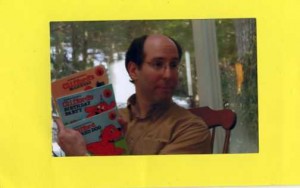It was not just about the presents. A baby shower would celebrate something I thought was out of my reach – parenthood. At 43, I was finally going to become a first-time mother. But I was also closer to my Jewish faith than in the past and knew Judaism frowned upon baby showers because of superstition passed down from one generation to the next. If parents-to-be celebrate prematurely, bad luck could follow. Oy. What a load to put on first-time parents.
Still, my husband and I partially bowed to Jewish superstition. We had a Welcome Baby party for a small gathering of relatives and friends less than a month before my due date. By that point, I was well in the comfortable zone for delivering a healthy baby. Guests were encouraged to bring a favorite children’s book.
I had mixed feelings about not having a traditional baby shower. Books were a grand idea. But what about blankets, crib sheets, burp cloths, baby bottles, a crib, diaper changing table, and onesies, and more onesies? In the Jewish debate about baby showers, bigger philosophical issues than a need for onesies are at play. The superstition stems from something spiritual in Judaism, I learned from a former rabbi of mine, David Stern. Rabbi Stern, who leads Temple Emanu-El in Dallas, told me that the spiritual dimension is the idea that “we shouldn’t get too overconfident about our own control of events.”
I write about this now because of something I read in a new book I just finished, Three Wishes, a True Story of Good Friends, Crushing Heartbreak, and Astonishing Luck on Our Way to Love and Motherhood.
The co-authors, Carey Goldberg (a former Boston Globe colleague of mine), Beth Jones, and Pamela Ferdinand all experienced a tragedy during pregnancy before having a healthy baby. Miscarriages happen. Genetic abnormalities happen. Disasters can happen as late as the day of delivery. Pam, after choosing to abort a baby with genetic defects, wrote about how she and her husband declined friends’ offers of cribs and baby clothes: “Thank you for your offer, we replied, but no, we don’t want anything until we are much closer to having a child here, in our arms, in our home. We know you’ll understand,” wrote Pam. The three authors reminded me just how uncertain pregnancy can be. Having a full-blown baby shower can add to the heartache later if there ends up being no baby.
At our Welcome Baby party, most of the gifts were books that included notes from the giver about why the book was important. A grandchild or a child – or the gift-giver – adored the book. We carried home the gifts in a few bags. Two weeks later, I gave birth to a healthy baby boy. We never, as I had feared, had to scramble to equip the house for our baby’s arrival. A crib and diaper-changing table came to us courtesy of hand-me downs. For those first several weeks, our baby Simon needed very little, except his mother’s milk, diapers, and his parents’ loving arms. Well, and he needed onesies.
The books from the Welcome Baby party are now old friends. We and our son have grown to love the books together. He now regularly asks for the Clifford the Red Dog books received before his birth. Goodnight Moon. We started reading that to him the day he was born. Goodnight Gorilla. The Butter Battle Book and Sneetches and Other Stories by Dr. Seuss. Brown Bear, Brown Bear. Guess How Much I love You. The Real Mother Goose. Peekaboo Bunny.
With advice from wise relatives, I believe that my husband and I figured out how to strike the right balance. We tried not to tempt fate too much, yet still had a low-key celebration. What was your route before your baby’s birth? Why? Tell Jewish Muse readers your own story in the comment box below. Should Jews still view baby showers as a jinx?







Pingback: Are Baby Showers a Jinx? Jews Often Debate the Question | RJ Blog